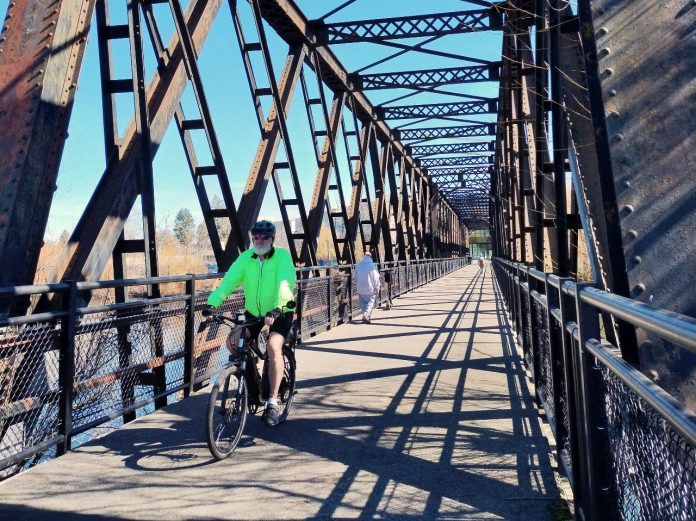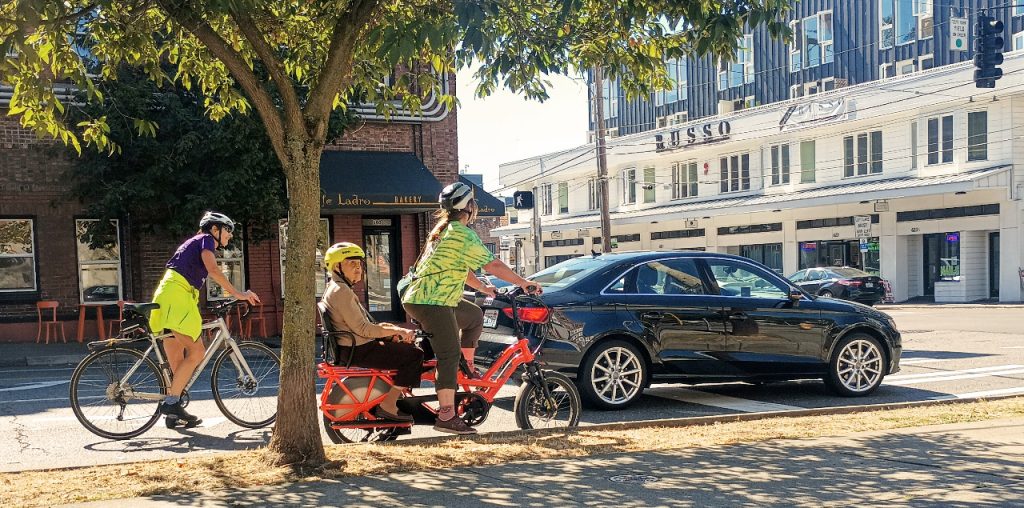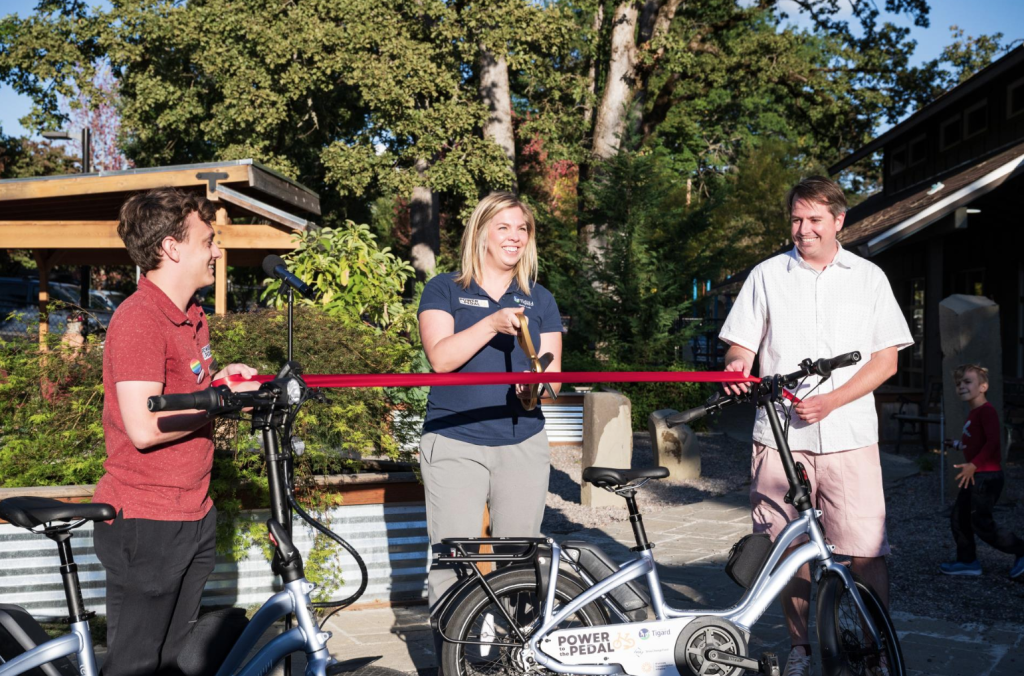
In 2023, Washington State took a big step toward joining the growing ranks of other states and cities around the country that are providing cash rebates for residents to purchase electric bikes. With a $5 million allocation in the state transportation budget, spearheaded by Senator Sharon Shewmake (D-42, Bellingham), the legislature signaled its intent to start to incentivize the purchase of e-bikes. Already, e-bike sales nationwide have outpaced the sales of electric cars, despite much larger subsidies for the latter.
Now, a year later, we still don’t have a firm date for when the e-bike rebates will be available, but the Washington State Department of Transportation (WSDOT), which has been tasked with administering the program, confirms work is still happening behind the scenes and a potential launch date is still on the horizon.
“Our team has been working hard to launch an e-bike rebate pilot program that not only gets rebates into residents’ hands, but also does so safely,” Hannah Weinberger, a communication lead for WSDOT’s active transportation division, told The Urbanist. “The legislative directive that provided for this program establishes some of its boundaries, but not exactly how it should operate. It will likely take several more months before we can stand up the program, but a lot is being done in the interim.”
Weinberger notes that most jurisdictions around the US have been able to stand up their programs within a year-and-a-half, a milestone that WSDOT will hit by the end of 2024, but stopped short of giving an expected date for launch.
E-bike rebates are taking off across the US as localities seek to find a way to quickly encourage more walking and biking trips, and e-bikes grow in popularity as many households increasingly turn to them as a way to replace at least one car in an urban environment. In Denver, the page to allocate instant rebates to residents sold out the entire inventory for 2024 within eight minutes, illustrating the way in which local governments are chasing to keep pace with high demand for e-bikes.
When established, Washington’s rebate program will provide an instant $300 off electric bicycle and tricycles, with an additional $900 available for purchasers who provide proof of a lower income, at 80% of their county’s median yearly wages or below. Per the state budget, 60% of the total funds for vouchers are earmarked for those low income purchasers. That $5 million also includes administration of the program itself as well as a study the legislature required to understand the impact of the program, so it’s not exactly clear how many total vouchers will be available with the remaining funds.

It’s almost certain, however, that the vouchers will go quickly, given the fact that fewer than 7,000 vouchers will be available for a state of more than 7.5 million people.
“If people currently have the means to get an e-bike without the rebate, they should strongly consider not waiting given those odds, and to consider how much riding enjoyment they’d be missing out on in the meantime. The rebates also won’t be available retroactively,” Weinberger said.
This work is happening against the backdrop of the high-profile rollout of Washington’s electric passenger car instant rebate program, set to launch in August with a budget of $45 million — nine times the amount allocated to e-bikes. Last week, Governor Jay Inslee joined state and federal officials to officially launch the program, which they are touting as the first low-cost electric vehicle (EV) lease program in the country. Being implemented by the Washington State Department of Commerce, it will provide income-eligible Washingtonians with $9,000 toward a lease on a new EV with a lifespan of three years or more, or $2,500 for a purchase or lease of a used EV. That rebate is on top of federal incentives, including a $7,500 tax credit for new electric vehicles.
“We’re one of the leading states in the nation for the adoption of electric vehicles, but we want to democratize EVs,” Governor Jay Inslee said at a press conference last week touting the new state rebate. “And today we’re democratizing EVs by giving a program to help more Washingtonians, thousands of Washingtonians, a way to finance these wonderful pieces of technology.”
But e-bikes went unmentioned as any element of an overall EV adoption strategy, even as Inslee noted the state’s planned investments in home solar panels, home heat pumps, and electric school buses.
The legislature also allocated an additional $2 million to stand up a e-bike lending library program, but that funding doesn’t even kick in until this July, so we have even fewer details on what that program might look like. The budget directs WSDOT to administer grants to other state departments, local governments, and tribes so they can operate their own individual e-bike lending libraries, and also allows nonprofit organizations who work with low income Washingtonians or those who live in “overburdened communities” to be able to apply for grants as well.
Washington’s program will likely provide grants that allow small communities, like schools, affordable housing complexes, and community organizations to stand up a library to allow free rentals of e-bikes for everyday use. Last year, the City of Tigard, Oregon, launched a pilot e-bike lending library with three bikes each at two housing complexes, using a $105,800 grant from Portland General Electric, as part of an overall program that is largely funding electric vehicle infrastructure.

E-bike lending libraries function as a tool for intermittent mobility needs, but also provide users with an opportunity to try out an e-bike and see how owning one permanently would fit into their life. With the $2 million provided by the legislature, access is set to be provided to communities across the state that might not normally have access to e-bikes.
In the months ahead, more details should come to light about when exactly the e-bike rebates are set to be available, and what the e-bike lending libraries are going to look like, but based on the experience of jurisdictions around the country, they’ll prove popular and will further accelerate the adoption of e-bikes across the state.
Ryan Packer has been writing for The Urbanist since 2015, and currently reports full-time as Contributing Editor. Their beats are transportation, land use, public space, traffic safety, and obscure community meetings. Packer has also reported for other regional outlets including Capitol Hill Seattle, BikePortland, Seattle Met, and PubliCola. They live in the Capitol Hill neighborhood of Seattle.


